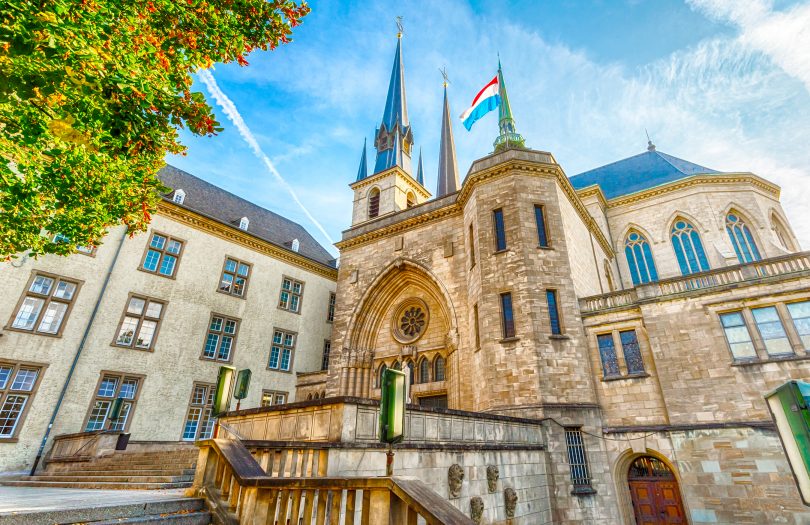Though many – but not all – of the EU member states have seen relaxing cannabis regulation in the last several years, Luxembourg is so far the only one to initialize legislation for legalized recreational cannabis.
Everyone is familiar with the Netherlands and how a person can sit in a coffee shop and puff on their favorite selection of marijuana without getting hassled by cops, or worrying about fines or prison sentences. In fact, there is often a misconception in the rest of the world that cannabis is actually legal in the Netherlands for recreational use, but this is not the case.
It is simply decriminalized with personal use laws, and still the possibility of facing some kind of punishment if said laws are broken. There are, in fact, many countries that operate similarly, with decriminalization laws and personal use laws that lessen or eliminate harsh punishments under many circumstances.
Countries like the Netherlands, Germany, Portugal, and Spain all have decriminalized cannabis legislation, with varying laws about how much a person can have for personal use, where personal use can take place, and the fines and punishments associated with breaking these rules. Luxembourg is the first EU member state to take it a step further.
Use the sign-up form to subscribe to the CBD Business Weekly Newsletter
What is Luxembourg?
Before even getting into their policies, lets take a look at the country in question. Luxembourg is hardly the most popular destination in Europe, but its popularity is growing which can be seen in the fact that nearly half of its population is from abroad. As of 2020, 47.4% of the population of the country came from outside of its borders.
As a landlocked country, Luxembourg sits in Western Europe being sandwiched between Germany, France, and Belgium. Luxembourg boasts a population of not much more than a half million making it one of the smallest, yet fastest growing, of the EU nations. It has some beautiful landscapes, is steeped in history, and has a strong economy with low inflation and a low unemployment rate.
Its capital – Luxembourg city – is one of the four capitals of the European Union, and Luxembourg is the location of the European Court of Justice, which is the EU’s highest court. Luxembourg is generally noted as a country with a very high quality of life, and has one of the strongest passports in the world allowing its citizens rights and passage that citizens of other countries do not have.
It’s not a loud country with constant news of social and political unrest, but rather a quiet country, getting by under the radar, even as it introduces some of the most liberal legislation regarding cannabis.
Luxembourg and cannabis regulation
While other countries weren’t even thinking about it, and while not being in the looser climate of today, Luxembourg first decriminalized cannabis back in 2001. Its reclassification to a Category B controlled substance modified the national drug laws of 1973 which were way more prohibition style, and opened the doors for personal use, possession, acquisition, and transport of the plant.
Pioneering Luxembourg Welcomes Medical Cannabis With Gusto
In 2017 this was followed up by a decision to start a medical cannabis pilot program which was unanimously passed in June of 2018 and put into place. As such, cannabinoids like CBD, a non-psychoactive constituent of the cannabis plant which has been highlighted in recent years for its proposed benefits to different health issues ranging from multiple sclerosis to insomnia to pain management, are also legal.
Next steps…
While this progress in and of itself was great, by the end of 2018, Luxembourg’s new coalition government stepped it up once again by introducing a plan to legalize cannabis recreationally. The three parties forming the coalition government: Luxembourg’s Socialist Working Party, the Democratic Party, and the Greens, decided they would legalize cannabis for commercial use.
In doing so, Luxembourg would become the first EU member state to formally and legally permit the use of recreational cannabis by adults. As of this date, the regulatory details are still being worked out and as of February the federal government had not yet approved the legalization plans set out by the Ministry of Health. There is no set date for this to go through, and no sure sum-up of what would be included in it.
All that’s come out is an initial blueprint, which was reportedly shared with local radio station 100.7. It states the following:
- Only adult residents of Luxembourg are eligible (as a means of keeping down cannabis tourism).
- Adults can acquire up to 30 grams a month.
- It cannot be used in public, or any already documented non-smoking area.
- Cannabis retail stores would be barred from selling tobacco and alcohol.
- Growing at home would be prohibited with users only able to acquire it from a couple domestic producers, and all sales coming from specified retail outlets (possibly 14 for the country).
- There would be no official cap on THC, but higher taxes would be levied on high THC products.
- Retail prices would be put in place by the government.
It bears repeating that these are not official requirements as the legislation for legalizing is not complete, and there is no actual promise that it will go through. The expected time before the full roll-out is two years in order to figure out issues relating to regulation and banking.
Isn’t it already legal in parts of the EU?
The short answer is, not exactly. As of yet, no EU member state has a federal mandate to legalize cannabis. Different EU member states, do, however, have their own laws, or loopholes, for localized legalization and personal use.
The Legal Landscape Of CBD Hemp Flower In Europe
One of the other big contenders for legalized cannabis in Europe, for example, is Spain. While Spain decriminalized cannabis and has personal use laws, it is still federally illegal. What makes Spain different than other places that have decriminalization laws like Portugal, and the Netherlands, is that they’ve used loopholes in their legislation to allow for ‘cannabis social clubs’. These clubs operate by being non-profit organizations that are run in a democratic fashion by their own members.
The way it works in Spain, legally, is that the constitution protects registered associations by requiring a court order for their dissolution. As they are officially registered as legal entities, they can distribute cannabis freely to members on their own private property which is licensed exclusively for their own members. Some even grow cannabis for their club participants. Members pay into their association entitling them to the cannabis benefits, without having to pay directly for the product. By licensing a private premise, these clubs satisfy local and federal regulations, and can stay in operation.
In this way, the people of Spain have found enough gray area in their legal framework to allow for pockets of protected legal recreational cannabis use, but as of yet, this has not changed federal regulation in the country. Spanish cannabis social clubs operate along with lax personal use laws which already do allow for cultivation and use that does not involve selling or trading the product.
Is Luxembourg’s approach really that different from personal use laws?
The thing about regulation is that each country has its own definitions and standards. What one country calls personal use might be what another sees as full-on legalization. The proposed stipulations to Luxembourg’s cannabis legalization (should they end up being what was stated previously) are not that different from personal use restrictions in places like South Africa, and come with certain limitations like the inability for an individual to grow their own cannabis which many personal use laws allow.
South Africa Introduces Some of the Most Lax Laws on Cannabis Yet
In this way, the stipulations as they’ve been presented leave a bit of loosening up room, and the full legalization isn’t quite as full as in other legalized places. Of course, until an official framework comes out, this is all just speculation, and if the law never comes into fruition, Luxembourg is still left with some pretty decent decriminalization policies, considering.
Conclusion
Things sure move slow in the world of laws and regulation. A proposed law can take years to be written, to pass legislative requirements, and then be enacted. For now, Luxembourg stands as one of the more forward-thinking countries when it comes to cannabis use. If they set up these new legalization standards, they’ll be world leaders in the quest for cannabis legalization.
Thanks for stopping by at CBDtesters.co, your one-stop-shop for all cannabis news. Check back frequently and make sure to subscribe to the CBD Business Weekly Newsletter to stay up-to-date on all cannabis, hemp, and CBD related happenings, all over the world.







